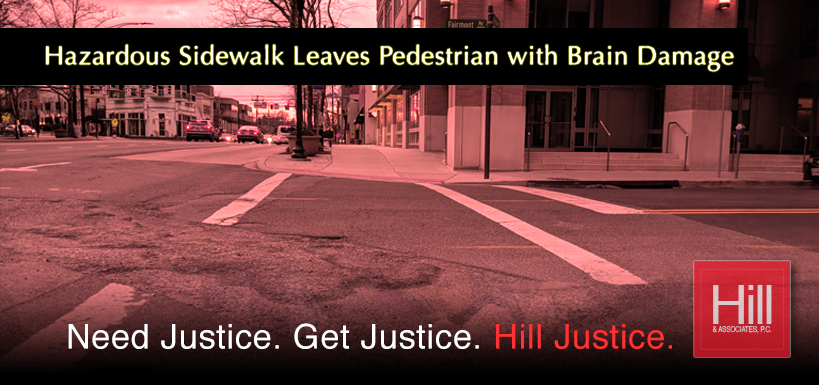Fall on Hazardous Sidewalk Leaves Pedestrian with Brain Damage

After her fall on an unkempt sidewalk led to brain damage, Leonard Hill carried out justice for Paulette Isaac.
When Paulette Isaac awoke in Jefferson University Hospital with her neck buckled in a collar and her temples pulsing from the most excruciating headache of her life, all she remembered was stepping out of her husband’s car the night of May 2, 2015, and crashing face-first to the broken sidewalk beneath her.
Isaac suffered a severe brain injury, long-term brain damage, and other significant, irreversible injuries from her fall. Once a DuPont accountant with an MBA, an accounting degree, and hopes of starting her own business, she was out of work and crippled with ear-splitting headaches, cognitive defects, and memory loss.
Leonard Hill, one of Isaac’s attorney, concluded that these life altering injuries “were brought on by the negligence of multiple companies,” who were hired to fix the dangerous sidewalk on which Isaac fell and who failed to meet the terms of their contracts.
“This fall should never have happened in the first place,” said Hill. “My client was gravely injured by someone else’s terrible work.”
The cracked and uneven sidewalk on which Isaac fell was directly across from the home she and her husband shared. The hazardous sidewalk, located at 3429 W. Commissioner St., had been a public safety issue for five-and-a-half months prior.
As part of a Philadelphia Gas Works (PGW) initiative to replace gas laterals, PGW subcontracted the replacement of the gas line and subsequent sidewalk restoration at this location to Danella Construction and Anthony Verrecchia & Sons, respectively.
The installation, which was meant to benefit the community, took a turn for the worse in November 2014 when Danella Construction mistakenly struck a gas lateral while cutting into the —causing a gas leak and requiring an emergency evacuation of the street for repairs.
This formed a trench-like hole which, aided by faulty repairs, laid the foundation for Isaac’s fall.
PGW addressed damages from the leak with cold patch asphalt, a temporary restoration method used primarily for short-term solutions in rural or low traffic roads until a permanent repair can be made.
Those repairs were never made, and in January 2015 a sinkhole formed.
On January 18, 2015, William H. Ross III, the owner of 3429 W Commissioner St., received complaints from his tenants that there was a sinkhole in the street and the basement was filled with two feet of water.
Mr. Ross went to the location and observed the sinkhole along the curb line as well as the flooding.
The sinkhole further degraded and de-stabilized the sidewalk, leading to additional surface deficiencies.
On Feb. 5, 2015, Anthony Verrecchia & Sons received a notice to restore the sidewalk.
Per its contract with PGW, the job site became its responsibility after 24 hours of receiving notice and had 30 days to complete the work, weather permitting.
The company failed to meet its contractual obligations. It did not complete the work on, or even visit, the site until May 12—almost two weeks after the time allotted for completion and after Isaac’s terrible fall.
At no point was caution tape or any form of warning sign placed at the site.
“If all parties did what they should have done, what they were contracted and paid to do, a tragedy could have been prevented,” said Hill. “And now because of their negligence, my client has permanent brain damage.”
Verrecchia & Sons finally visited the site on May 13, 2015, one day before Isaac was discharged from the Jefferson University Hospital.
To say she had recovered was far from the truth.
During her stay, Isaac underwent cranial surgery for a subdural hematoma suffered as a result of her fall. Subdural hematoma refers to a condition in which blood collects outside of the brain, forming a hemorrhage (blood clot) and causing increased pressure and internal bleeding that can be life threatening.
The need for cranial surgery was determined in July 2015, nearly two months after the initial fall, as Isaac’s conditions worsened dramatically over that time.
To properly remove the clot, the doctors created a “burr hole,” a small hole drilled into the side of Isaac’s skull, to drain the blood. This had physical complications of its own, likely adding to the levels of pain Isaac experienced in headaches following the fall and the surgery. Additionally, the cost of her operation, hospital stay, and expected future medical expenses totaled hundreds of thousands of dollars.
Hill sought to recover these funds for Isaac by bringing suit against both Verrecchia & Sons and Danella Construction in Philadelphia.
“These injuries will forever impact Mrs. Isaac,” Hill said. “While she may never recover to the physical and mental state she enjoyed before, she is entitled to full economic compensation to support the medical treatment and care she needs to get through this.”
Ultimately, the two construction companies settled by paying Isaac a combined $900,000.
Said Hill, “the money, of course, cannot give her old life back, but it can at least be fair compensation for the pain and expenses she endured.”
